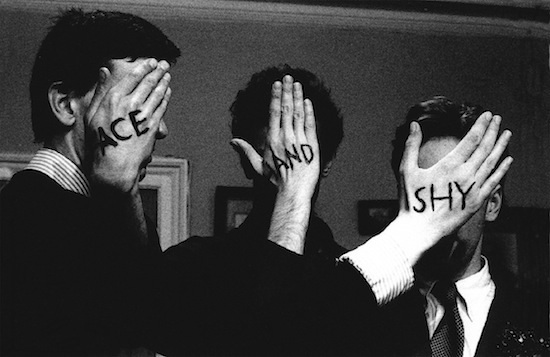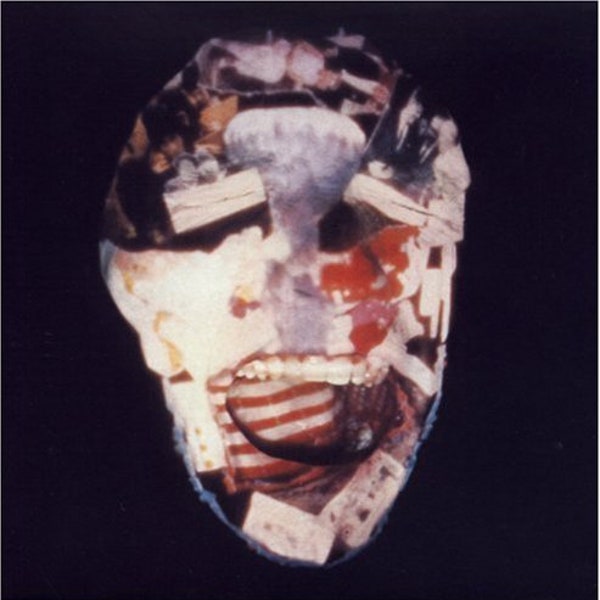
This Heat was a short-lived band tangentially involved with the British punk/post-punk scene of the late ’70s. Comprising of multi-instrumentalist Charles Bullen, multi-instrumentalist Charles Hayward, and non-musically trained at all whatsoever but played some instruments anyway visual artist Gareth Williams, the group combined elements of their varied backgrounds to create what MUSIC HISTORIANS would later describe as the “missing link between progressive rock and post-punk”.
Although they were not the very first to do this kind of thing (Throbbing Gristle, for example, was active for about a year before This Heat started working on recording their debut), This Heat coalesced their disparate influences into something incredibly succinct and musically meaningful in ways that weren’t achieved by the likes of Throbbling Gristle and similar contemporary progenitors. While early industrial music projects sought to flip the idea of “music” on its head and present something purposefully transgressive, bastardized, and inaccessible, This Heat brings something…well, equally transgressive, bastardized, and inaccessible, but with sincerity! There’s the difference, I think. Plus, like accidental prophets, This Heat predicted the path of art-rock, post-punk, post-rock, noise rock, indie rock, industrial rock, experimental music, ambient music, electronica, and progressive rock. Succinctly. Ah, but was the band actually ahead of its time, or was This Heat just so influential and in the right place at the right time that they set the course themselves? That’s the real question.
As for the “missing link between progressive rock and post-punk” bit, I agree and disagree with that one. Agree, because This Heat’s music is truly neither progressive rock NOR post-punk, and I guess if there was a missing link to fill single-handedly by one outfit like This Heat, then there you have it I suppose. Disagree, because much, much, much of post-punk takes its lead from krautrock, and if anything it’s krautrock that’s the missing link here since krautrock is a cousin of progressive rock in the first place. This Heat owes a lot of their debt to Can, Faust, Kraftwerk, maybe some Amon Düül, and, again, to say they were the first to channel it into the experimental proto-post-punk context is still not true. That’s where we need to be discussing Throbbing Gristle, Cabaret Voltaire, even Karlheinz Stockhausen. However, the band did all their recordings in a repurposed meat locker, so perhaps they were more progressive than I give them credit for.
And there you have it. The band called it quits after releasing their second album due to artistic differences (inevitable with three very strong artistic personalities). Williams died of cancer in 2001, but Bullen and Heyward reunited to perform music under the name This Is Not This Heat between 2016-2019.
JUMP TO:
(1979) This Heat
(1981) Deceit
This Heat (1979) – Rating: 7/10
No Full Album Review Yet

Blaming heavy metal music as a recruitment tool for fake cults during the Satanic Panic of the ’80s is especially funny, considering albums like This Heat’s self-titled debut from 1979 is way scarier than anything any heavy metal band could ever come up with. Recorded over the span of about two years, the band experimented with tape loops, microphone placement, vocal modulation, and tape manipulation. The humble beginnings of this album’s recording sessions predate post-punk entirely, but to call This Heat a post-punk record is a misnomer. This is an industrial record.
On an intellectual level, this music is really something. All the careful planning, sequencing, and recording techniques have resulted in a transcendentally eerie product. For people like me born in the late ’80s who have nothing more than a hazy memory of the pre-Soviet collapse, music like this is the closest thing I have as the strange, unsettling soundtrack to the Cold War era. The group creates tension using unassuming, low-volume passages and then releases that tension with occasional sudden bursts of noisy aggression. The lo-fi recordings add an extra layer of foreboding dread, like the band was holed up in a bunker and This Heat is their black box-type final recording.
As such, I think This Heat would be a much more powerful album if it were the band’s only album (but, ironically, the band would likely have faded to obscurity if this was their only output). The project on an intellectual level bumps the rating up a few points, but on a pure enjoyment level this is a challenging listen. The two “Testcard” bookend tracks are just the same low-volume drone of white noise; the first “Testcard” tricks the listener into turning up the volume so they be blasted with loudness at the top of “Horizontal Hold”, which is a raw combination of sharp drum patterns and abrasive electronic interstitials. Tracks like the slow and static “Not Waving”, or the delicate pots-and-pans percussion of “Water”, or the creepy muffled lyrical poem of “Music Like Escaping Gas”, these all feel like a collection of pieces that don’t unify fully into a singular artistic statement. In fact, the first real genuine instance where I even really perk up during a listen of This Heat happens on Track 6, the accessible “24 Track Loop” with its steady techno beat and bizarre Atari-era electronic noises.
While the cold, curiously foreign feel that this record demonstrates from beginning to end is intriguing, I find it difficult to get too worked up about any of this. I love my experimental and industrial noise projects, don’t get me wrong, but I have a feeling the bulk of the real influence This Heat had on future musicians came from their second album.
Deceit (1981) – Rating: 9/10
No Full Album Review Yet

Yes, now we’re talking! Deceit, the second and final studio long play, takes the avantgarde sonic landscapes of This Heat and works it into a more appealing, loosely song-oriented enterprise. Deceit‘s existence is equally as important for the band as This Heat in shaping their legacy, because a) it shows they didn’t try to do the same thing twice, b) they were able to prove that they could innovate within their own constraints, and c) they provided a second, completely different angle to channel that same nuclear war anxiety that the debut was also working to deliver. If this album didn’t come out, really no one would have cared about this group at all. Period.
Throughout Deceit we hear more lyrics than before, which means more overt political statements. They’re employing the same haunted, lo-fi abandoned meat-locker production as they did on This Heat, continuing to add a layer of hopeless tension to these otherwise cheerful tunes! We start with “Sleep”, which is unlike anything we’ve actually heard before from This Heat. It’s a creepy, desperate lullaby urging the listener that one can always just sleep to escape “We never forget you have a choice/Possibilities in store, a taste of paradise/Success on a plate for you, endless promises“. “S.P.Q.R.” is a banger reminiscent of contemporary post-punk acts like Wire or The Pop Group, based on ancient Roman politics and the current-day satirical translation of “S.P.Q.R.” (“We Are All Romans!”). “Cenotaph” uses completely atonal and unnerving tritone scales or something, with Williams’ anguished “History repeats itseelllllllf“. There’s so much sociopolitical history going on in all these sentiments, and I’m really fucking dumb about any kind of history, so much of this is completely lost on me on a lyrical level. BUT, oh man, it sounds vital to me anyway! That’s how you know it’s powerful.
The record ends with the instrumental “Hi Baku Shyo (Suffer Bomb Disease)”, which leaves the listener with an audio illustration representing dropped bombs in Japan during WWII.
As statements of harrowing geopolitical unrest, the debut beats out Deceit marginally by painting a scarier musical picture, but Deceit is by far the more satisfying lasting impression.
Maybe some day I’ll also review their 1980 EP Health and Efficiency, which displays the transition between the This Heat sound collages and the Deceit song compositions! It’s a good EP for sure, but I’m not an EP-reviewing-kinda-guy! Listen to that too though. 8/10.







Click here to ridicule this post!